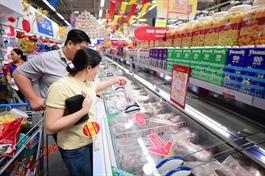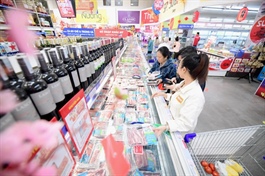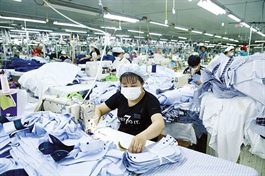Exporters on edge following Trump’s “liberation day”
Exporters on edge following Trump’s “liberation day”
Unexpectedly high US tariffs are likely to impact Vietnam in multiple ways, especially in terms of its high reliance on exports.
A 46 per cent so-called reciprocal tariff on Vietnamese imports, to be enforced from April 9, has sent shockwaves through the business community, leaving many companies grappling with a sudden escalation in trade barriers.
With such a rate, the price of Vietnamese goods in the United States will skyrocket, reducing competitiveness compared to other countries such as China, India, and Mexico.
Key industries such as textiles, footwear, electronics, wood, and seafood will be affected, and it is estimated that exports to the US could decrease sharply, possibly 30 per cent or more, depending on the ability to redirect the market, according to VPBank Securities.
In response to the US move, which accounts for approximately 28-30 per cent of Vietnam’s total export turnover ($136.6 billion in 2024) and about 26 per cent of its GDP, leaders within Vietnam’s garment and textile industry have swiftly held meetings to assess the situation.
Pham Van Viet, chairman at Viet Thang Jean Co., Ltd., said that the substantial retaliatory tariffs imposed by the US on Southeast Asian nations are aimed at regulating Chinese goods entering the US. He suggested that an immediate solution involves clarifying and ensuring transparency regarding the origin of materials used in goods exported to the US, which could facilitate negotiations with American counterparts.
“Additionally, the industry employs a large workforce. Therefore, the current concern is how to manage this. Transitioning markets in the sector could take 2-3 years for acceptance,” he said.
The majority of clothing and footwear sold in American retailers such as Walmart and Target are produced abroad, with Bangladesh, Vietnam, and China being the top exporters.
Pham Thi Thanh Xuan, vice chairwoman and general secretary of the Vietnam Leather, Footwear, and Handbag Association (LEFASO), emphasised the gravity of the situation, noting that the sector was confronting an “extremely significant challenge” in the forthcoming period. The US market has been a cornerstone for Vietnam’s leather and footwear exports, with a value of more than $10 billion.
Despite the daunting scenario, Xuan advises against panic. “Leather and footwear production has largely shifted away from the US, positioning Vietnam as a reliable supplier deeply integrated into the American supply chain,” Xuan said. “However, the increased costs necessitate that businesses devise strategies to sustain production and optimise processes to offset the impending tax burdens.”
She underscored the importance of market diversity, saying that Vietnam’s engagement in free trade agreements offers avenues for diversification. “Prioritising expansion into these markets is essential for businesses aiming to mitigate the adverse effects of tariffs,” Xuan added.
The LEFASO is advocating for governmental interventions, including policy enhancements, administrative reforms, tax incentives, and expedited customs procedures. Such measures are intended to alleviate operational costs and facilitate smoother production workflows for enterprises.
Meanwhile, furniture and wood products rank fourth in the list of Vietnam’s main exports to the US. Ngo Sy Hoai, vice chairman and general secretary of the Vietnam Timber and Forest Product Association, described the tariff as “terrible” and expressed hope for negotiations to mitigate its adverse effects.
“Industry leaders and government officials are actively seeking solutions to minimise the tariff’s impact on the export sector. Efforts include diplomatic negotiations, policy adjustments, and industry-wide strategies to sustain the growth and competitiveness of Vietnam’s wood industry in the global market,” he said.
Do Ngoc Hung, head of the Vietnam Trade Office in the US under the Ministry of Industry and Trade, stated that recent high-level dialogues between Vietnam and the US reflect Vietnam’s goodwill in encouraging fair trade policies.
“Vietnam is seen as a responsible trading partner, and its recent actions have helped build trust and deepen the comprehensive strategic partnership, especially in the economic sector,” Hung said. “In the current context, Vietnam needs to effectively implement cooperation mechanisms and bilateral agreements with the US. At the same time, efforts should be made to concretely expand market access and import certain key US products that align with Vietnam’s domestic needs.”
- 15:42 08/04/2025



























